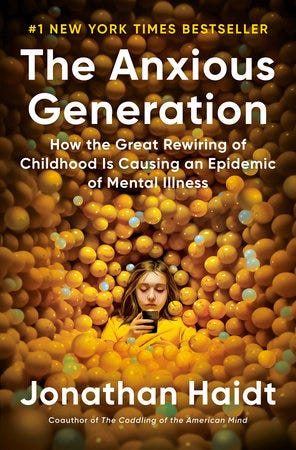"The Anxious Generation" by Jonathan Haidt
Smart phones, gaming, and porn have rewired our brains and we’ve taken play and risk away from our children.
I wish I’d had this book as a young parent. Of course, the data in this book didn’t exist back then. So this book isn’t so much for me and my children but about me and my children. It’s easy to blame smartphones for the increasing anxiety and depression in today’s youth. It’s even easier to blame the pandemic. However, in this well-researched book, Haidt demonstrates that phones alone aren’t the root cause, and these troubling trends began well before 2020.
Haidt argues that experience, not information, is the key to emotional development. Phones and tablets, he says, are experience blockers. And while social media the data show social media disproportionately harming girls, boys’ experience blockers are games and porn. Compounding the issue, our society has dramatically reduced children’s exposure to social and physical risk, depriving them of critical opportunities to grow, shoulder responsibility, and gain independence. For example, the ages at which children are allowed to walk to school alone or stay home unsupervised have shifted dramatically—from 5 or 6 for Boomers and Gen Xers to 12 or 14 for Millennials and beyond. In our well-meaning efforts to keep our children safe, we have inadvertently stunted their growth.
Haidt notes that if we want beauty and art to play a more significant role in our children’s lives, we must send them into those spaces without their phones—and often without hovering adult supervision. (As a side note, I appreciated that Haidt referenced the work of Dacher Keltner, whose book Awe I read earlier this year, in exploring the loss of wonder in our lives.)
Haidt also quotes Alison Gopnik, who contrasts two approaches to parenting: carpentry and gardening. Carpentry, focused on precision and predictability, seeks to mold children into specific outcomes. Gardening, by contrast, creates a safe and nurturing environment while allowing children to grow in surprising and beautiful ways.
Regarding smartphones, one of Haidt’s key points is the lack of regulation. He recounts a conversation with Meta’s Mark Zuckerberg, where Haidt pointed out that many kids under 13 have Instagram accounts, despite the platform’s rules. Zuckerberg claimed, “We don’t allow that,” but Haidt had no trouble creating a fake minor account—and repeated the experiment a year later with the same results. Haidt likens this to the tactics of the tobacco industry, as social media companies seek to hook younger users for their own benefit. He argues that Congress must regulate these platforms because neither the companies nor society at large will address these harms on their own.
Haidt offers several reforms, supported by convincing data:
No smartphones before high school.
No social media before age 16.
Phone-free schools (elementary through high school).
More opportunities for unsupervised play and independence.
Gambling is heavily regulated. So are tobacco and alcohol. After reading The Anxious Generation, it seems ridiculous that social media isn’t as well. I think eventually it will be, and it will be because of books like this and the data they cite.
For more on Haidt’s movement, visit AnxiousGeneration.com and at his Substack After Babel.
READ IT IF: You have kids, know someone who has kids, and/or find yourself habitually reaching for your phone first thing in the morning.
If you’re even moderately interested in this subject, watch Haidt’s TED interview. It’s a great primer for his book.
I first watched Jonathan Haidt's 2008 TED Talk, The Moral Roots of Liberals and Conservatives, over 15 years ago, and its insights have stayed with me ever since. It wasn’t until I finished reading The Anxious Generation and revisited Haidt’s work that I made the connection between the talk and the book. Discovering that both emerged from the same brilliant mind was a delightful realization.





